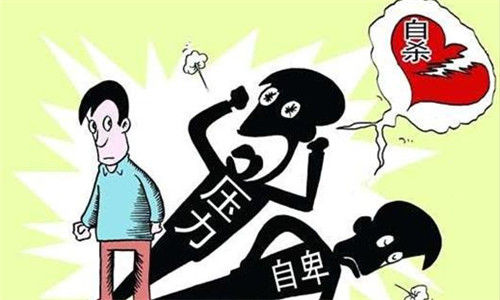Article/Sina columnist Jiang Feng
 As we all know, Japan is a "suicide power". According to the statistical data updated by the World Health Organization in 2012, 21.7 people commit suicide every year in every 100000 people in Japan, ranking the 8th in the world and the forefront among developed countries.
As we all know, Japan is a "suicide power". According to the statistical data updated by the World Health Organization in 2012, 21.7 people commit suicide every year in every 100000 people in Japan, ranking the 8th in the world and the forefront among developed countries. The sea of green trees at the foot of Mount Fuji is known as Japan's "suicide forest", also known as the "suicide shrine". Now, every year in the warm spring, the police and the fire department will form a joint team to search inside, and carry out one body after another that has committed suicide at an unknown time. The stage of Kyoto Shimizu Temple, the thousand year old ancient capital of Japan, is also known as the "romantic suicide shrine". For many years, many people have jumped down from there. The famous writer Ryunosuke Akutagawa committed suicide by taking medicine, leaving behind a Akutagawa Prize that is still being evaluated today. The famous writer Kawabata Yasunari committed suicide with gas, which reminds people that he was the first person in Japan to win the Nobel Prize for Literature.
Why is Japan's suicide rate so high? For Japan, which has passed the initial stage of national and social development, people have no worries about food and clothing, and suicide is relatively rare simply because of living conditions. From the perspective of Japanese culture, some people think that there is a longing for "death" in Japanese culture. The Japanese love cherry blossoms, which are suddenly fragrant and fleeting. A person's life does not lie in how long it lasts, but in "living brilliantly". For a long time, the samurai who committed suicide under the cherry tree have become symbolic "aesthetic symbols" in Japan.
In my opinion, this is just the romantic view of a litterateur. Now, after a comprehensive analysis of the cause of death of suicide in Japan, it is found that it is actually caused by a disease that people are both familiar with and unfamiliar with - depression.
In short, what really made the whole Japanese society pay attention to depression was a case. In March 2000, Japan Telecom Group was sentenced by the court to compensate 168 million yen to the family members of the deceased former members. The reason is that a new member who entered the company just one year and five months later suffered from depression due to long-term overwork and pressure, and then committed suicide.
In fact, as early as 1996, the Japanese government promulgated the Basic Law on Suicide Countermeasures. In 1999, Japan's statistics showed that the social losses caused by suicide and depression amounted to 2 trillion 700 billion yen a year. In 2000, some analysts believed that suicide caused by depression accounted for 40% of all suicides, making people feel that "depression is stronger than tigers".
All medical institutions in Japan attach great importance to this. Now as long as you click "depression" on the network, the initial test questions of professional medical institutions will pop out immediately. Even research is carried out in different places and periods.
Winter morning, whether you are depressed. I can't get up in the morning. I just want to eat sweets. And the weight increased inexplicably. The above phenomenon is easily regarded as "lazy disease" in China. In fact, this is likely to be diagnosed as "winter depression" in Japan.
Mishima Kazuo, head of psychophysiological research at the National Research Center for Psychiatry and Neuromedicine of Japan, put forward the "cause of depression in winter". He believed that the sun exposure in winter was insufficient, the daytime time was shorter, the opportunity to go out was reduced, and the neurotransmitter serotonin could not be synthesized normally, which might cause depression.
Winter depression is different from general depression, with no obvious symptoms. More people regard it as "winter burnout". In the late 1980s, the United States judged it as "seasonal affective disorder". However, Japan attributes it to depression, which reflects the importance of medical research on depression.
Japanese people are also active in preventing and treating depression. Sapporo, Hokkaido, holds a "Forum on Suicide Prevention" every Saturday, inviting people who have suffered from depression and later recovered to make speeches to encourage patients with depression to regain their courage in life. One person who has experienced depression for five years said: "People who have not experienced that kind of pain will not understand.". Maybe this sentence has done the bitterness of depression patients.
After the "Diantong incident", Japanese enterprises also began to pay attention to depression. In the survey of 252 listed enterprises in 2010, 70.2% set up a mental health consultation system and 67.0% set up a telephone and email consultation window.
Depression is not a "cold of the soul", but a "fracture of the soul". Ursula Nuber, a German psychologist, pointed out in his book Don't be afraid of depression that "one of the characteristics of all patients with depression is that they try to hide behind the appearance of 'everything is normal' as long as possible", "Their great self-control and strong will still enable them to fulfill their daily obligations and requirements, while leaving their illness to themselves, so that people around them will not be aware of it."
Today, Japanese society attaches great importance to relevant symptoms, and let the society actively care for patients with depression, rather than doubt and rejection. In addition to medical intervention, perhaps as the song goes, "As long as everyone gives a little love, the world will become a better world".
(Statement: This article only represents the author's view, not Sina.com's position.)
